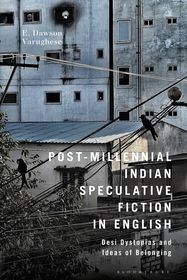
Post-Millennial Indian Speculative Fiction in English
Desi Dystopias and Ideas of Belonging
- Publisher's listprice GBP 85.00
-
40 608 Ft (38 675 Ft + 5% VAT)
The price is estimated because at the time of ordering we do not know what conversion rates will apply to HUF / product currency when the book arrives. In case HUF is weaker, the price increases slightly, in case HUF is stronger, the price goes lower slightly.
- Discount 10% (cc. 4 061 Ft off)
- Discounted price 36 548 Ft (34 808 Ft + 5% VAT)
Subcribe now and take benefit of a favourable price.
Subscribe
40 608 Ft

Availability
printed on demand
Why don't you give exact delivery time?
Delivery time is estimated on our previous experiences. We give estimations only, because we order from outside Hungary, and the delivery time mainly depends on how quickly the publisher supplies the book. Faster or slower deliveries both happen, but we do our best to supply as quickly as possible.
Product details:
- Publisher Bloomsbury Academic
- Date of Publication 20 March 2025
- Number of Volumes Hardback
- ISBN 9781350241107
- Binding Hardback
- No. of pages pages
- Size 238x160x16 mm
- Weight 440 g
- Language English
- Illustrations 10 bw illus 647
Categories
Short description:
Explores Indianness in English-language Indian Speculative Fiction and how this connects to socio-cultural changes within the country in order to present a workable definition for this nascent form of fiction
MoreLong description:
Exploring expressions of 'Indianness' buried within and scattered across post-millennial Indian speculative fiction in English, this book asks questions around what it means to 'belong' to an India of 'now' and what it might mean to belong to multiple Indias of the (near) future.
With dystopia, near-future, apocalyptic Indias and fantastical metropolises all imagined across this body of writing, Post-Millennial Indian Speculative Fiction in English traces economic, social and political transformations in post-2000 'New India' across these various narratives. Drawing on established notions of the speculative, Dawson Varughese argues for a recognized, post-millennial canon of Indian speculative writing in English which moves beyond Western-centric frames of reference, centring instead on Indian sensibilities, expressions of belonging to India and speculative 'Indian' futures.
Organized around key tropes and characteristics of post-millennial Indian speculative fiction in English to date - urban infrastructures, citizenship, bodies and biotech, future (Indian) histories and climate catastrophes - it takes stock of a range of science fiction, fantasy, near-future and dystopian novels and short stories and offers critical insights into the writings of Samit Basu, Varun Thomas Mathew, Gautam Bhatia, Rimi B. Chatterjee, Prayaag Akbar and Anil Menon, alongside many others.
Post-millennial Indian Speculative Fiction in English examines shifting ideas of what it means to belong to India and conceptions of India as a nation and pulls these ideas together, creating a workable framework of understanding for this nascent field as we move into the third decade of the millennium.
Table of Contents:
Foreword: Anil Menon, author of the speculative fiction novel Half of What I Say (2017)
1: Post-millennial India and ideas of Indianness
2: Speculative fiction in India
3: Speculative cities - walls, spaces and zones
4: Speculative bodies - clones, medicine and biotech
5: Speculative future histories - environment, technology and other worlds
6: Defining post-millennial Indian speculative fiction in English
Bibliography
Index










